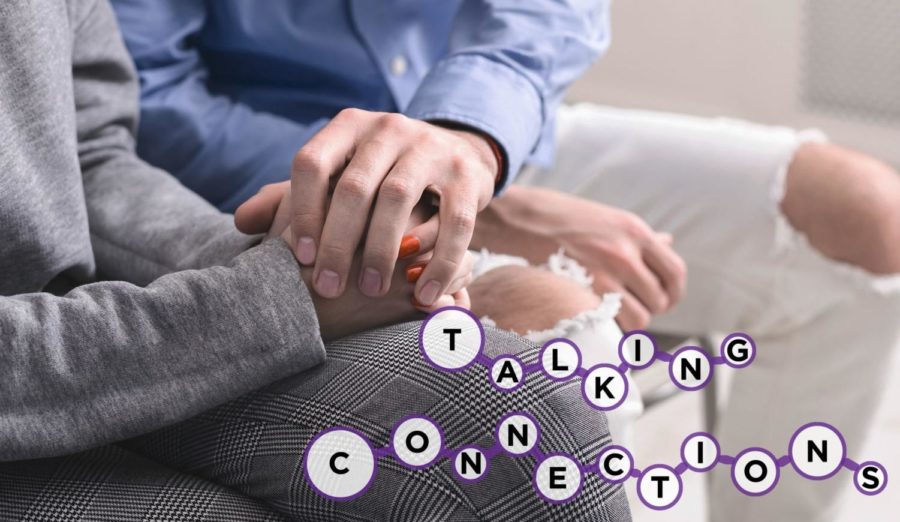Talking Connections: Intimacy and its impact on relationships
Intimacy can be a big part of relationships, romantic and otherwise, and intimacy or the lack thereof can impact people in different ways. Aspects of a relationship like trust and communication can play into what that intimacy looks like.
February 6, 2020
Editor’s note: This is part two in our weekly relationship series “Talking Connections.” Sensitive content may follow.
Intimacy can be a big part of relationships, romantic and otherwise, and intimacy or the lack thereof can impact people in different ways.
David Wahl, graduate sociology student, studies human sexuality, sex and gender.
“Intimacy means something different to everyone,” Wahl said. “To some people, intimacy is a sexual relationship, for some people, it’s another person that they know is always going to be there for them, that they can talk to about anything, it could be that platonic friendship between two people.”
Intimacy can look different for various people and scenarios can vary with the type of relationship such as friendships, long-term and short-term romantic or sexual relationships.
Additionally, intimacy can be expressed in many ways, such as physically and emotionally. Emotionally, people can share personal information with their romantic partner or friend and allow themselves to be real and honest with them.
Some people may experience a fear or avoidance of being intimate with others and sometimes there’s a specific instance that led them to have that fear and want to avoid it. People may also have a fear of intimacy because it gives them feelings of anxiety.
If two people trust one another and somewhere in the timeline of their relationship, that trust is broken, it can result in hard feelings and maybe even the end of the relationship.
“This lack of emotional support, giving and receiving, can lead to less satisfying relationships,” said Kristi Costabile, assistant professor of psychology. “However, it is important to note that emotional support patterns develop as a result of our experiences, so having positive, trusting, supportive relationships can lead people to be more willing to seek and provide support; and having negative relationships characterized by mistrust can lead people to be less willing to seek out and provide support.”
Being intimate with a romantic partner can be an intimidating thing. Components of the relationship like trust, length of relationship and more can go into how intimacy is expressed and progresses.
“Either way it’s all about communication, everything is about communication when it comes to intimacy,” Wahl said. “But with a sexual partner, it’s about are you able to open yourself up fully to be satisfied the same way you’re expecting your partner to be satisfied. Are you able to talk about what you want and what you don’t want.”
The sex education young people receive could also contribute into the lack of communication about intimate subjects. Wahl said in his research he found most people had abstinence based sex education.
“I want to write a whole book on sex education in America,” Wahl said. “It’s the single biggest problem because it feeds into this stigmatizing society that we have. It feeds into not talking when we’re talking about intimate issues. It feeds into all those things that are negative and it tells you to shut up about this stuff, it’s not appropriate talk. If the sex educators aren’t talking about it, then their students aren’t going to want to talk about it.”
To effectively communicate, there needs to be some level of trust between partners, which can be difficult for those with trust issues. Another reason someone might refrain from opening up to their partner is the fear of rejection or being labeled as “not normal.”
“There’s different reasons that people don’t feel they’re able to open themselves up to another person, in this case sexually, because we live in a society of sexual scripts — what you can and cannot do, what you should and should not do — which builds into our sexual normativity,” Wahl said. “And people are judged harshly if they fall outside of what is considered appropriate sexual behavior, which leads to people being stigmatized, people being shamed, we have a problem with slut shaming.”
These sexual norms can sometimes influence people to hold themselves to strict expectations. Today’s society can be quick to judge someone based off of what they do with a sexual partner or how they dress and act.
Someone may feel uncomfortable with being intimate with a partner because they’re afraid of their partner’s reaction. It can be hard to know how someone will react to their partner telling them something personal like a fetish they may have, a sexual act they’re not interested in or their insecurities.
Wahl said the number one question he gets from those who seek his advice is “Is this normal?”
“They’re afraid to ask anyone because they’re afraid of being stigmatized because they find out oh, it’s not normal,” Wahl said. “And the answer is 100 percent of the time, yes it is normal. You’re not the only one that has this proclivity. But that’s what most people worry about, ‘I’m feeling this way, is it normal to feel this way?’”
Those struggling with communicating and being intimate with a partner may want to seek some sort of counseling. Couples therapy is another resource that could potentially aid in opening up the conversation.







